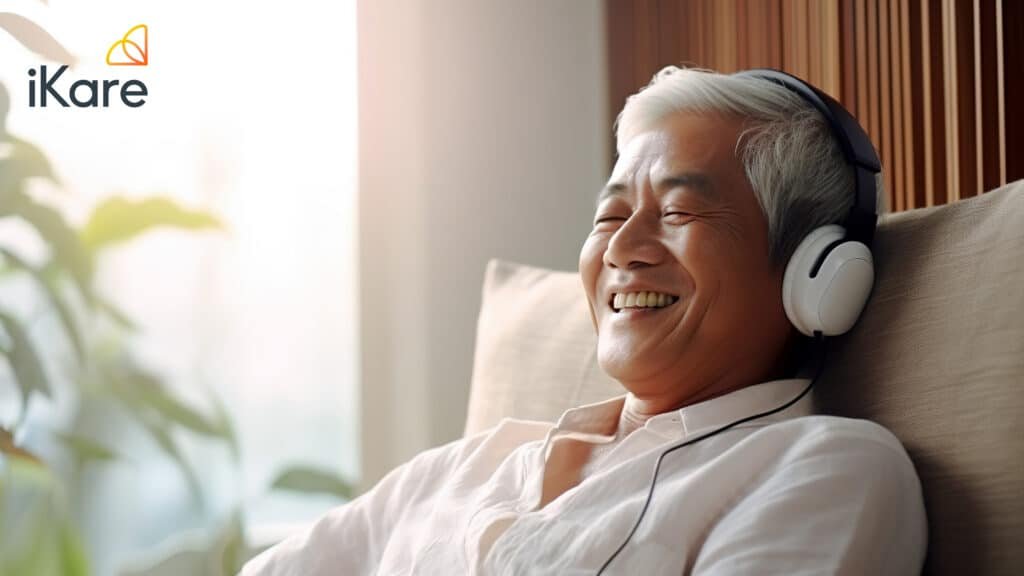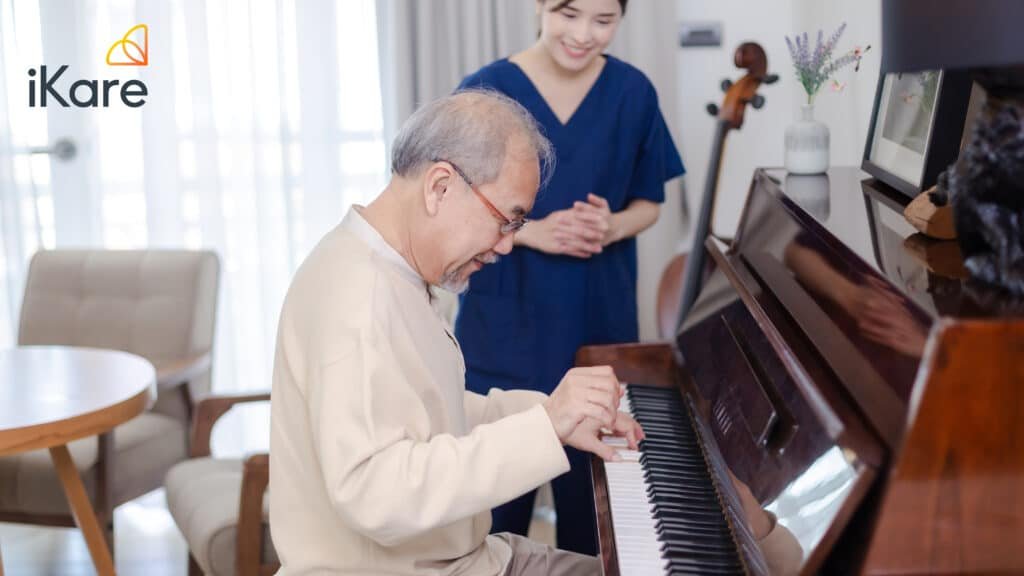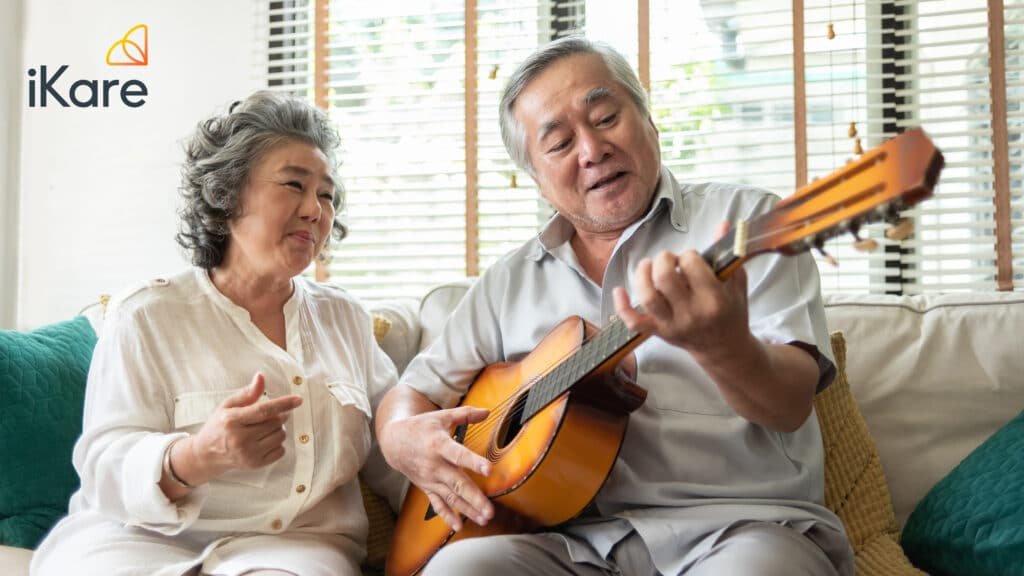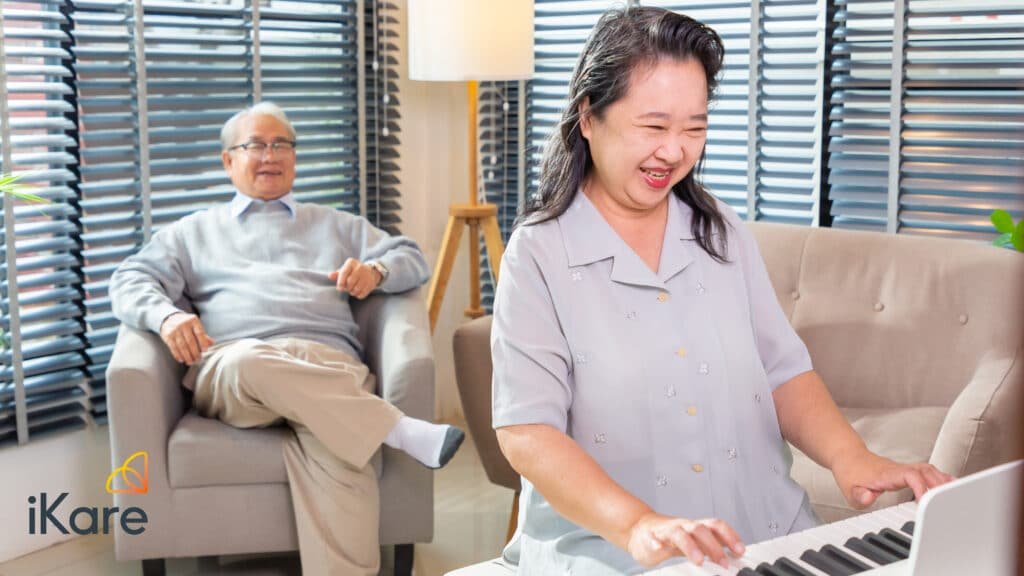
Music is a universal language that transcends age, culture, and background. For seniors, engaging in music offers a powerful tool to enhance mental, emotional, and physical health. At iKare, we recognize the profound impact that music can have on our elderly clients. As part of our SPARK programme, music activities are designed to stimulate the mind, uplift the spirit, and enrich the overall quality of life for seniors.
The Benefits of Music Activities for Seniors:
- Cognitive Enhancement
Participating in music activities has been shown to have significant benefits for seniors, particularly those with dementia or Alzheimer’s disease. Engaging with music can stimulate memory recall, enhance attention, and support executive functions. Songs from a senior’s past can trigger memories and emotions, helping them reconnect with their identity and history. - Emotional Wellbeing
Music has a profound effect on mood and emotions. For seniors, music activities can reduce feelings of depression, anxiety, and loneliness. Listening to or participating in music-making can release endorphins and dopamine, leading to improved mood and emotional stability. Music also provides a creative outlet for expression, which is particularly beneficial for those who have difficulty communicating verbally. - Social Interaction Group music activities provide opportunities for social interaction, which is crucial for emotional and mental health. Singing, playing instruments, or simply listening to music in a group setting can foster a sense of community and belonging. These social connections can reduce feelings of isolation and enhance overall happiness.
- Physical Health Benefits
Music activities can also contribute to physical health. Rhythmic music can encourage movement and exercise, which are vital for maintaining physical health in seniors. Simple activities like tapping to the beat, dancing, or playing instruments can enhance motor skills, coordination, and physical endurance.

The Science Behind Music Activities:
Research has consistently shown the positive effects of music on the brain. According to studies published in journals such as the Journal of Music Therapy and Aging & Mental Health, engaging with music can significantly reduce agitation and improve cognitive performance in individuals with dementia. Music engages multiple areas of the brain, including those involved in memory, emotions, and motor control. This widespread brain activation helps maintain and improve cognitive functions in seniors.

Practical Applications of Music Activities
- Memory Care
In memory care, music activities can be particularly effective. Familiar songs can evoke memories and emotions from the past, making them a valuable tool in dementia care. Facilitators use music to help seniors recall personal memories and experiences, fostering a sense of identity and continuity. - Stress Reduction
Music activities can be used to manage stress and anxiety. Calming music can help reduce heart rate and lower levels of the stress hormone cortisol. This is especially beneficial for seniors who may experience anxiety due to health issues or changes in their living environment. - Pain Management
Music activities can also be effective in pain management. Listening to music can release endorphins, the body’s natural painkillers. For seniors dealing with chronic pain or recovering from surgery, music can provide a non-invasive way to alleviate discomfort.

Incorporating Music Activities into Daily Life
For those interested in incorporating music into daily routines, here are some practical tips:
- Create Playlists: Develop playlists of favorite songs from different stages of life. Familiar music can be comforting and uplifting.
- Sing Along: Encourage singing along to favorite tunes. This can boost mood and provide a fun activity.
- Use Instruments: Simple instruments like drums or tambourines can be used for interactive sessions. Playing instruments can enhance motor skills and provide a sense of accomplishment.
- Attend Group Sessions: Join group music activities or local singing groups to benefit from social interaction and community support.

SPARK Programme at iKare
At iKare, our SPARK programme encompasses a range of activities designed to promote cognitive, physical, and emotional wellbeing. Music activities are a key component of this holistic programme. Here’s how the SPARK programme ensures effective music engagement:
- Personalised Sessions: Each music activity is tailored based on the individual’s health condition, musical interests, and needs. Whether it’s singing familiar songs, playing instruments, or listening to soothing music, the sessions are crafted to maximise engagement and benefit.
- Integration with Care Plans: Music activities are integrated into the broader SPARK care plans of our clients. This holistic approach ensures that music activities complement other therapeutic interventions, providing a well-rounded care experience.
Conclusion
Music activities offer a multitude of benefits for seniors, from enhancing cognitive functions to boosting emotional wellbeing and physical health. At iKare, our SPARK programme is dedicated to providing a variety of high-quality activities, including music, that cater to the unique needs of each senior. If you are looking for a holistic approach to elder care that includes the transformative power of music, consider iKare’s SPARK programme. Contact us today to learn more about how we can help elevate the wellbeing of your loved ones through our comprehensive range of activities.

